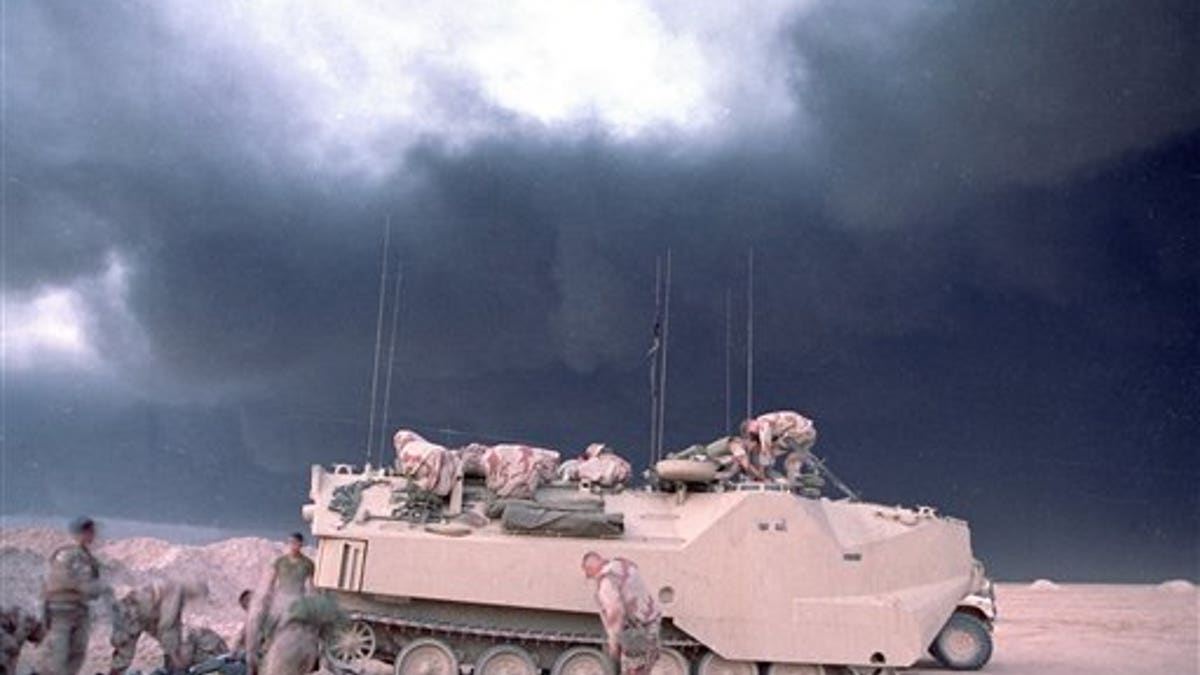
File photo from 1991 shows smoke from a burning oil well in Kuwait billowing upbehind a U.S. Marines armored vehicle. (Associated Press)
Afghanistan, Libya, Iraq, Syria, Yemen—all places where the United States has been fighting and losing.
Compare the U.S. record in those places with the liberation of Kuwait in 1991. After one hundred hours of combat, Iraq’s large and entrenched military was defeated and pushed back behind a security zone. Twenty-five years later Kuwait remains a free and independent country.
The United States’ only real failure respecting the Gulf War has been misreading its lessons, a failure that has played a role in the long string of military reversals ever since.
Two false lessons stand out: hawks believe it was a mistake to liberate Kuwait and return home. They advocated continuing to Baghdad to depose Saddam Hussein from power. Similarly, certain NGOs saw the might of the coalition as the right tool for promoting human rights, including by removing dictators.
These lessons overlooked essential aspects of the Gulf victory. It was built fundamentally on strict adherence to international law, and, in 1991, America’s political and military leaders included combat veterans with no illusions about what war could and could not accomplish. Going all the way to Baghdad would have violated the very United Nations Charter rules that had unified the world in a mission to end aggression.
We now know from social science research of the past two and half decades that outside military intervention to impose governments doesn’t work. This fact is related to the reality that such interventions are unlawful. When lives are shattered and the environment destroyed for illegitimate ends, the morale of invading troops and the anger of the victims factor in the outcome. In the Gulf War, Saddam Hussein was the one violating fundamental principle. In America’s wars since the Gulf, it has been U.S. presidents.
The most important rule of the United Nations Charter is the prohibition on the use of force. Saddam Hussein violated that rule in one of the most blatant acts of aggression since the Charter was drafted in 1945.
Kuwait had the right to exercise self-defense but was quickly overrun and went to the Security Council to request assistance. The Council acted unanimously and effectively. The U.S. ambassador, Thomas Pickering, was masterful—demonstrating the value of an experienced diplomatic corps, committed to international law.
The Security Council ordered worldwide sanctions against Iraq. After five months when those failed to persuade, the Council authorized force to liberate Kuwait. 34 nations joined the fight. Others contributed financially. The United States incurred no deficit.
In addition to the Charter, the United States military fought consistently with the Geneva Conventions. Our forces had benefited from the rule of law program instituted after Vietnam. America’s Vietnam debacle has been correctly linked to the illegitimate ends of imposing a regime there and in the way U.S. troops and the CIA fought. Widespread atrocities, of which the My Lai massacre was only one, drove reforms, which paid off in the Gulf as educated, disciplined troops handled 15,000 Iraqi prisoners of war in exemplary fashion.
I know all of this first hand as the wife of America’s most forward deployed interrogator in Operation Desert Storm. He was the Geneva Conventions trainer for the Third Armor Division. He was incredulous when Maryland National Guard troops -- who abused prisoners in Iraq’s Abu Ghraib prison after the 2003 invasion -- said they had had no Geneva Conventions training. That was not the profile of the fighting men and women of the Gulf War victory. They knew they were fighting to end unlawful aggression. They knew how to fight and how to interrogate lawfully, morally, and effectively.
In Washington, President George H. W. Bush, a combat veteran of the Second World War, Secretary Colin Powell, Chairman of the Joint Chiefs of Staff and veteran of Vietnam, and National Security Adviser, Brent Scowcroft, a West Point graduate and long-serving officer, all understood what military force could accomplish. It is a poor tool for re-shaping societies, changing leaders and imposing systems of government. Those choices must be made by the governed. Pushing one major military across an international boundary with a superior force is what a military can do and succeed.
The knowledge that a soldier is fighting on the side of right and fighting in a way that complies with the rules is empowering. Fighting unlawfully and in violation of the rules weakens morale, costs allies, and angers victims.
At Scowcroft’s West Point graduation, Dwight Eisenhower said, “War is mankind’s most tragic and stupid folly; to seek or advise its deliberate provocation is a black crime against all men.”
Provoking war and the unlawful use of military force have cost the U.S. dearly. Part of the high cost has been in terms of standing, influence, and the ability to uphold the prohibition on aggression.
Russia is violating the U.N. Charter in Ukraine but those rules are viewed as weak today. The U.S. faces a dangerous situation in the South and East China Seas but is hardly in a position to demand that China settle its disputes peacefully.
And yet it can. The Gulf War teaches that regardless of past mistakes, the United States can succeed by complying with the law going forward.
President Bush declared at the end of the 100-hour war that we would see a “new world order under the rule of law.” The time to see that new order is now.
Anniversaries are when we look back and see history in the light of experience. Recent hard experience counsels internalizing the real lessons of a unique victory.








































